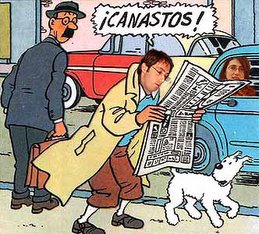Chirac's legacy
Too much bullshit, too much bla bla bla in the medias. But thank you, we have the New York Times! Siempre nos quedará el New York Times.
Next chapter I hope will be a revision of the positive years of Gerhard Schröder and Joschka Fischer.
I always say the same: Tony Blair, the good looking man, the "I'm the Godfather of new politics", the moralist. But you know, may be the others were not so smart, but they tried to work for Europe. Also for themselve, It's true. But Blair is not better than them. Blair is a populist and a lier. And there is the Iraq War. At least Chirac and Schröder don't go to sleep every night with feelings of being responibles of the thousands of deaths in Iraq.
C.
April 22, 2007
Op-Ed Contributor. New York Times.
France Looks Ahead, and It Doesn’t Look Good
By TONY JUDT
IT is easy to underestimate Jacques Chirac.
Today the French will begin to vote for a new president, and soon Mr. Chirac, the 74-year-old incumbent, will pass from the scene unmourned. Over a political career spanning nearly five decades, during which he was mayor of Paris, prime minister (twice) and president for 12 years, Mr. Chirac appears to have achieved little.
As mayor from 1977 to 1995, he oversaw a steady rise in political corruption and municipal graft (albeit both at insignificant levels by American big-city standards). As president, he abandoned his promises to resolve shortcomings in France’s employment laws and social services in the face of street protests. And he has done little to redress the grievances of France’s minorities or the anxieties of young people. On both sides of the Atlantic, Mr. Chirac’s political obituary is being written in distinctly unflattering terms.
But is the French situation really so dire? From every quarter one hears calls for “reform” to bring France more in line with Anglo-American practices and policies. The dysfunctional French social model, we are frequently assured, has failed.
In that case there is much to be said for failure. French infants have a better chance of survival than American ones. The French live longer than Americans and they live healthier (at far lower cost). They are better educated and have first-rate public transportation. The gap between rich and poor is narrower than in the United States or Britain, and there are fewer poor people.
Yes, France has high youth unemployment, thanks to institutionalized impediments to job creation. But the comparison to American rates is misleading: our figures are artificially lowered because so many dark-skinned men aged 18 to 30 are in prison and thus off the unemployment rolls.
Meanwhile, recall what Jacques Chirac has done. In 1995 he became the first president to acknowledge openly France’s role in the Holocaust: “The occupier was assisted by the French, by the French state,” he said. “France accomplished the irreparable.” This was a phrase that would have stuck in the craw of his much-lauded predecessor, François Mitterrand, and, it must be said, of Charles de Gaulle himself.
However low his political fortunes, Mr. Chirac forbade his supporters to ally or compromise with Jean-Marie Le Pen’s racist and xenophobic National Front — again in contrast with Mr. Mitterrand, who cynically manipulated French election laws in 1986 to benefit Mr. Le Pen (and thus weaken the moderate right).
Conscious of Europe’s links to the Muslim world — and the cost of rebuffing and humiliating Islam’s only secular democracy — Mr. Chirac has steadfastly supported Turkish admission to the European Union, an unpopular stance among his conservative constituents. In 2004 he created the first French administrative agency with explicit powers to identify and fight discrimination.
On the global stage, he has been perhaps the most outspoken major world leader on global warming, warning that “humanity is dancing on a volcano.” And, of course, he initiated and led international opposition to President Bush’s war in Iraq.
Let’s not forget the hysterical Francophobia of 2003: not just the imbecilities of “freedom fries” but xenophobic outbursts from Congress, the Bush administration and the mainstream American press, where prominent commentators called for France to be thrown off the Security Council and offered to let French “weasels” hold our coats while Americans once again did their fighting for them.
It wasn’t only Americans who objected. When in 2003 Mr. Chirac told the Eastern Europeans who backed Mr. Bush and Prime Minister Tony Blair of Britain on Iraq that they had “missed an opportunity to shut up,” his blunt talk upset a lot of people and did little for France’s popularity.
But in all of this, he has been proved right. By standing up to Mr. Bush and instructing his representatives at the United Nations to block a rush to an unprovoked war, the French president saved both the honor of the United Nations and the credibility of the international community.
It is not obvious that any of his likely successors would have done as well. Mr. Chirac is old enough to appreciate Europe’s debt to America — on the 60th anniversary of D-Day he said, sincerely, that “France will never forget what it owes America, its steadfast friend and ally” — but Gaullist enough to oppose Washington’s folies de grandeur. His heir presumptive, Nicolas Sarkozy, is neither.
Mr. Sarkozy’s admiration and knowledge of the United States appear confined to its economic growth rate. He opposes Turkish membership in the European Union in the most intolerant terms: “If you let 100 million Turkish Muslims come in, what will come of it?” And his Gaullism is tainted by a weakness for rightist catchwords — “nation” and “identity,” not to mention “scum” when referring to rioting minority youths — with which he hopes to outflank Mr. Le Pen.
Ségolène Royal, the socialists’ candidate, has a Joan of Arc complex (in her declaration of candidacy last October she spoke of hearing “calls” and accepting “this mission of conquest for France”), and she practices what could be called a “soft” demagogy. On crucial issues — the European Union Constitution, Turkish admission to Europe — she has avoided commitment, promising instead to “listen to the people.”
Many of Ms. Royal’s socialist supporters manage to be both anti-American and anti-European: a Royal presidency would thus probably weaken the European Union without in any way strengthening France’s trans-Atlantic leverage — a leftist mirror of the agenda of neoconservative strategists in Washington.
Neither Mr. Sarkozy nor Ms. Royal (nor the centrist François Bayrou, the only other candidate with a serious chance of advancing to the runoff after today’s initial voting) shares Mr. Chirac’s historical appreciation of what is at stake in the construction of Europe: why it matters and why those who would divide or dilute it are playing with fire.
On this score, Mr. Chirac has reason to worry. Some new European Union member states want it both ways: to have an American-style low-tax economy that is underwritten by subsidies from Western European taxpayers. Poles and Czechs are happy to accept such handouts from Brussels, in the form of “solidarity funds,” yet at the same time welcome American missile defense systems without even consulting their fellow Europeans. Romania’s entry into the union this year hasn’t kept its president, Traian Basescu, from continuing to seek a “strategic Washington-London-Bucharest axis.”
In the hands of a new generation of politicians out for local advantage and indifferent to the past, Europe could unravel very quickly. Those who now celebrate Mr. Chirac’s departure should recall Rhett Butler’s admonition to Scarlett O’Hara when she sneered at the straggling remnants of the Confederate Army: “Don’t be in such a hurry to see them go, my dear; with them goes the last semblance of law and order.”
With the departure of Jacques Chirac, we are saying goodbye to the last semblance of statesmanship from a generation that remembered where an unraveled Europe could lead. I fear we shall miss him.
(Tony Judt is director of the Remarque Institute at New York University and the author of “Postwar: A History of Europe Since 1945.”)



1 comentario:
interesante artículo.
sin embargo, habría que señalar que la mayoría de los logros que judt atribuye a chirac corresponden a lo que cabría llamar la política 'simbólica', ciertamente admirable pero insuficiente. los logros 'prácticos' son escasos.
así, chirac ha reconocido las culpas francesas en el holocausto, ha plantado cara a estados unidos, ha defendido el mensaje europeísta.
pero, ¿de qué sirvió la vociferación chiraquiana contra la guerra de iraq? ¿evitó la guerra? ¿en qué ha contribuido chirac a la integración europea? ¿cuál ha sido su aportación en oriente medio? esto, por no entrar en la política económica y social en Francia. En términos objetivos, ¿está Francia mejor ahora que antes de llegar Chirac al poder? ¿ha bajado el paro? ¿ha superado la "fractura social" que denunciaba cuando llegó a la presidencia? ¿o se ha acentuado?
Sin ánimos de restar méritos al excelente artículo de Judt, creo que éstas son algunas de las preguntas que hay que responder si se pretende hacer un balance equilibrado de la era Chirac.
Publicar un comentario